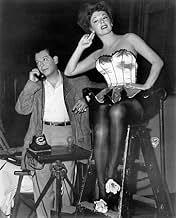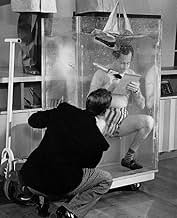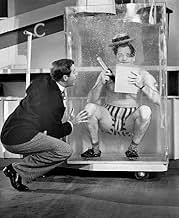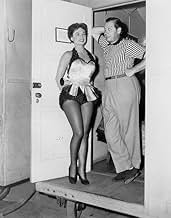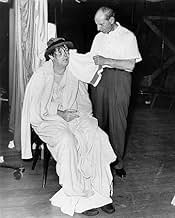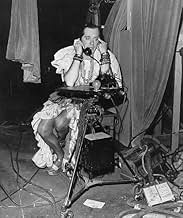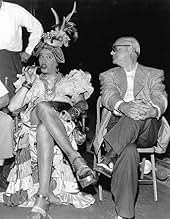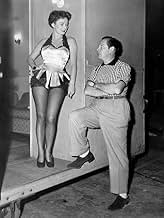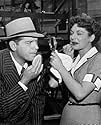Aggiungi una trama nella tua linguaA young comic plays second-rate nightclubs and chintzy resorts in his struggle to break into the big time.A young comic plays second-rate nightclubs and chintzy resorts in his struggle to break into the big time.A young comic plays second-rate nightclubs and chintzy resorts in his struggle to break into the big time.
- Regia
- Sceneggiatura
- Star
Richard Avonde
- Minor Role
- (non citato nei titoli originali)
Edward Biby
- Smoker
- (non citato nei titoli originali)
Recensioni in evidenza
Probably not intended as such in 1949, in retrospect this film shows an interesting juncture between old time show biz and the imminent influence of television, which changed everything. The film captures some fascinating relics of an earlier time, such as Bert Lahr reprising a famous burlesque-type routine of his from the early '20s. Milton Berle excels in acting out all sorts of comedic styles and formats then in vogue or already seen as passe. Despite its chirpy title song, the film has a surprising toughness and unsentimentality for its era (witness the happily cruel "Men's Club" scene). Recommended for those into show biz history, and also a great way to see some genuinely funny stuff.
A small-time comic works his way up to the big time.
The two hours is mainly for fans of Uncle Miltie. Berle is in just about every scene, along with a number of his costumed skits. As expected, some skits are funnier than others; however, I wish this overlong movie had stayed on a light comedic level. Instead, it veers off near the end into heavy drama, which could have been easily lopped off.
Catch that bouncy opening—as I recall, it plays much like Berle's hit TV show that helped put TV on the map in the early days. Anyway, if guys get tired looking at the star, there's the delectable Ruth Roman standing around in various stages of undress, and also a shapely Virginia Mayo doing some surprisingly good dance steps. Comic actor Bert Lahr gets his turn on the stage. But to me, his brand of humor is a matter of taste.
I suspect Warner Bros. was testing the waters to see if Berle's appeal carried over to movies as well as TV, in the way it did for Bob Hope over at Paramount. However that may be, I think the movie would be better if shorter and strictly light-hearted.
The two hours is mainly for fans of Uncle Miltie. Berle is in just about every scene, along with a number of his costumed skits. As expected, some skits are funnier than others; however, I wish this overlong movie had stayed on a light comedic level. Instead, it veers off near the end into heavy drama, which could have been easily lopped off.
Catch that bouncy opening—as I recall, it plays much like Berle's hit TV show that helped put TV on the map in the early days. Anyway, if guys get tired looking at the star, there's the delectable Ruth Roman standing around in various stages of undress, and also a shapely Virginia Mayo doing some surprisingly good dance steps. Comic actor Bert Lahr gets his turn on the stage. But to me, his brand of humor is a matter of taste.
I suspect Warner Bros. was testing the waters to see if Berle's appeal carried over to movies as well as TV, in the way it did for Bob Hope over at Paramount. However that may be, I think the movie would be better if shorter and strictly light-hearted.
I happened upon this film by accident whilst I was channel surfing. Having never seen "Uncle Milty" in an acting role before I just had to stop and watch.
While this films story is one of those behind the scenes show biz stories of a comic trying to get into the big time, what I found to be absolutely fascinating was the character of Rene played by Iphigenie Castiglioni in what can only be read as a very, very lesbian night club owner for whom Berle auditions doing a comedic routine playing the piano and singing Miss Otis Regrets, a song written by the very gay Cole Porter.
The nightclub owner Rene with her mannish hairstyle, tuxedo (worn during the day!) and long, long cigarette holder with her aperitif is the quintessential gay stereotype for the era. How the combination of Rene in her garb and the suggestive Cole Porter song got past the censors is beyond me, but I am sure it was quite appreciated by gay audience members as an acknowledgment of their presence in show business.
While this films story is one of those behind the scenes show biz stories of a comic trying to get into the big time, what I found to be absolutely fascinating was the character of Rene played by Iphigenie Castiglioni in what can only be read as a very, very lesbian night club owner for whom Berle auditions doing a comedic routine playing the piano and singing Miss Otis Regrets, a song written by the very gay Cole Porter.
The nightclub owner Rene with her mannish hairstyle, tuxedo (worn during the day!) and long, long cigarette holder with her aperitif is the quintessential gay stereotype for the era. How the combination of Rene in her garb and the suggestive Cole Porter song got past the censors is beyond me, but I am sure it was quite appreciated by gay audience members as an acknowledgment of their presence in show business.
"Always Leave Them Laughing" is an interesting curio in many ways, but isn't a particularly good movie. Let me explain. When this film was made back in 1949, Milton Berle was the biggest name on television and much of his show's success was based on Berle doing t the sort of shtick he'd been doing for years in Vaudeville. So, here you get to see a semi-autobiographical film where Berle does a lot of the corny and over-the-top routines that made him famous. However, and this is VERY important, a lot of it just isn't funny. The jokes are so old and familiar that many viewers will recognize them and the rest fall pretty flat. Worst of all is the cop routine by Bert Lahr--that REALLY aged poorly. Yes, he was popular in the good old days but today this seemed very tired and cringe-worthy at times. Another thing that will make you cringe is seeing Berle do a third-rate Jolson routine--in black- face! Plus, Berle's character was, at times, really difficult to like.
Is it all bad? No. When Berle isn't trying to be funny he's pretty good. And, it's surprising to see how limber and graceful he is when he dances--and several of the dance numbers (particularly with Lahr) were nice. But this just isn't enough. The film is a window into a bygone era...one that just doesn't work or entertain in the 21st century.
Is it all bad? No. When Berle isn't trying to be funny he's pretty good. And, it's surprising to see how limber and graceful he is when he dances--and several of the dance numbers (particularly with Lahr) were nice. But this just isn't enough. The film is a window into a bygone era...one that just doesn't work or entertain in the 21st century.
Lo sapevi?
- QuizThe "Fountain Pen Sketch" was taken from the hit musical "Make Mine Manhattan" that opened in New York on 15 January 1948 at the Broadhurst Theatre, 235 W. 44th St. and ran for 429 performances, and starred Sid Caesar. Max Showalter, who performs that specialty number in this movie, was also in that opening night cast playing the same role, as well as others.
- BlooperAfter Kip meets with Eagen, a brief clip is shown of a train heading to Boston, with a Southern Pacific locomotive. The Southern Pacific Railroad served California and the south west, and would not have gone to Boston or anywhere in the northeast.
- Citazioni
Monte Wilson: [Checking out Kip's suit] Very conservative.
Kipling 'Kip' Cooper: Conservative? Why it could be elected on a Republican ticket without anyone in it.
- ConnessioniReferenced in Texaco Star Theatre Starring Milton Berle: Episodio #2.11 (1949)
- Colonne sonoreAlways Leave Them Laughing
(1949) (uncredited)
Written by Sammy Cahn and Milton Berle
Sung during the opening credits and first scene by Lynn Davis, Lorraine Crawford,
Flo Farmer, Mary Castle, Alice Wallace and Nita Talbot
Reprised by them with Milton Berle at the end
Variations in the score throughout
I più visti
Accedi per valutare e creare un elenco di titoli salvati per ottenere consigli personalizzati
Dettagli
- Data di uscita
- Paese di origine
- Lingua
- Celebre anche come
- The Thief of Broadway
- Luoghi delle riprese
- 1655 Broadway, Manhattan, New York, New York, Stati Uniti(Lindy's Restaurant, exterior)
- Azienda produttrice
- Vedi altri crediti dell’azienda su IMDbPro
- Tempo di esecuzione
- 1h 56min(116 min)
- Colore
- Proporzioni
- 1.37 : 1
Contribuisci a questa pagina
Suggerisci una modifica o aggiungi i contenuti mancanti


